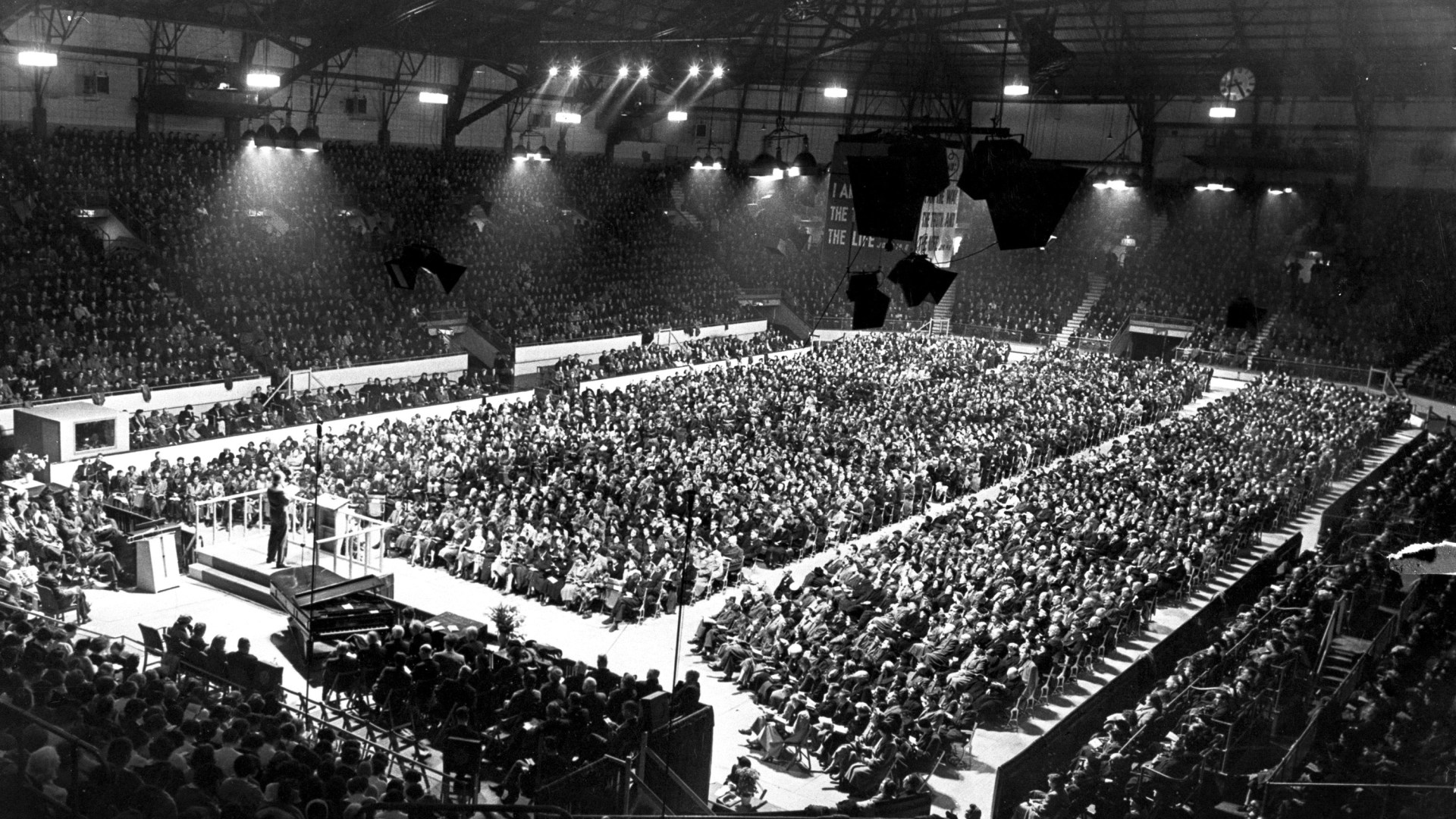In March 1952, while still a layman, I was fortunate enough to be invited to a gathering of 750 evangelical leaders, not-quite-leaders, and not-yet-leaders at Church House in central London. We gathered to hear a 35-year-old American evangelist speak and answer questions about his burgeoning crusade ministry.
Billy Graham's address, based on Habakkuk's prayer that God would revive his work, averred that God was working a modern-day revival through the remarkably fruitful large-scale missions that he had been leading. He was relaxed, humble, God-centered, with a big, clear, warm voice, frequently funny and totally free from the arrogance, dogmatism, and implicit self-promotion that, rightly or wrongly, we Brits had come to expect from American evangelical leaders. He was engaging in his style, displaying the evangelist's peculiar gift of making everyone feel that he was addressing them personally. He monologued for 90 minutes and answered questions for another hour. Though somewhat prejudiced at that stage of my life against all forms of institutionalized mass evangelism, I ended up admiring the speaker and rejoiced that I had been squeezed into the meeting. In retrospect, it stands in my memory as something of a landmark.
This meeting was held to consider whether to invite Graham to lead a crusade in London. Two days after his star performance, the invitation was issued—the first step on the road to the Harringay crusade, by far the most momentous religious event in 20th-century Britain. Hundreds, perhaps thousands, of lasting conversions, spinning off into dozens of vocations to evangelical pastoral ministry, led to high morale and significant spiritual advance through the next generation, despite the inroads secularism had made into British life. That Billy Graham left an indelible mark on England is not open to doubt.
It has been said that in spiritual things, when you are being attacked on both sides, you are probably positioned right. Graham came to England in the 1950s. During that time, he was under constant fire in America for not being a combative, non-cooperative fundamentalist. In England, however, he found himself consistently opposed by Anglican and Free Church leaders, who railed at him for being precisely that, and therefore a thoroughly undesirable influence on the British scene.
Those were the days in which so-called “liberal” and “critical” orthodoxy ruled the roost in Britain's theological teaching centers, and the reigning image of evangelicalism was of a crude, standoffish, individualistic, and anti-scholarly distortion of the historic faith, always under-appreciating God's kingdom and God's church. But the critics found they had nothing to fear from their American visitor. Their real threats came from within.
It is now clear that, far from being a benchmark of alert faith, “liberal/critical orthodoxy” was a comprehensive shaking-off of the Christian commitment to the objective authority of biblical teaching, and thus a first step down the slippery slope toward naturalistic relativism and subjective speculation. Contributions to the debate from John Stott, myself, and others had some success in making this clear. In this we vindicated Graham's stand for the full inspiration and authority of the Bible, widely if not universally recognized today as the authentically Christian approach to the task of determining God's truth.
Graham's British breakthrough was the first step on a truly global ministry, which he sustained for more than a generation, bringing an authentically biblical message of Christ's cross, resurrection, present reign, and future return. His initiatives brought together evangelicals from around the world for mutual encouragement, prayer, and deliberation over the ongoing missional tasks of evangelism, church-planting, Christian nurture, and poverty relief.
Graham's vision and enterprise have moved global evangelicalism forward, leaving it less parochial and more ecumenical in its posture toward other cultures and faith traditions. Liberalism, though stubbornly entrenched in many places, has almost totally collapsed as a nurturing force, while the Christ of the Scriptures, as preached by Graham, has in the past half-century transformed hearts and minds across Africa, Asia, South America, the United States, and (though less spectacularly) Britain and Canada.
Throughout his ministry, Graham manifested a remarkable empathy toward the needs and cares of every community he visited, adding to the sense of Christ-like authority in his substantially unchanging proclamation. This also had a unifying effect, both theologically and attitudinally; shared embrace of “the gospel Billy Graham preaches” has become a bond of fellowship between Christians of different backgrounds all around the world. Hopefully, though he is gone, these bonds of common evangelistic endeavor will remain strong.
J. I. Packer, a native of England, is professor emeritus of theology at Regent College in Vancouver, British Columbia.










